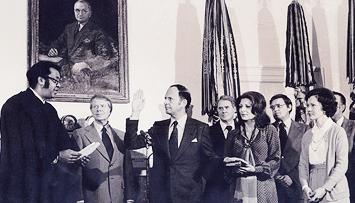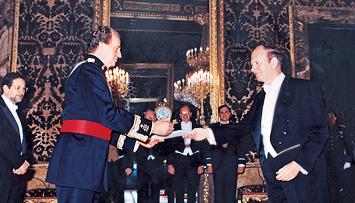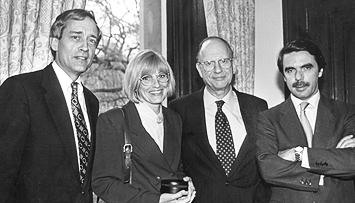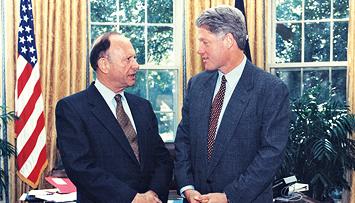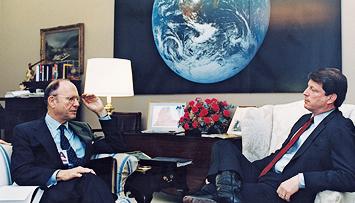Gardner's Gifts
New York, April 6, 2012—Over the past six decades, Professor Richard N. Gardner, a leading expert on the United Nations and international law, has educated, inspired, and mentored thousands of students, chiefly through his storied seminar “Legal Aspects of U.S. Foreign Economic Policy.”
Many of these graduates of both the Law School and Columbia University’s School of International Public Affairs now hold high-ranking positions with the U.S. Department of State, the International Court of Justice, the Obama White House, and economic power centers throughout the world. Several have followed in his footsteps directly and have become diplomats, as Gardner did when he served as U.S. ambassador to Spain and to Italy while on leave from the Law School.
More than 100 of these alumni luminaries will return to Columbia to honor Gardner upon his July retirement from teaching, not by presenting him with a retrospective dinner or traditional gold watch, but rather by participating in a thought-provoking conference. Among the esteemed group will be two of Gardner’s special protégés—his daughter, Nina Luzzatto Gardner ’86, the founder and director of Strategy International; and his son, Anthony “Tony” Gardner ’90, a managing director of Palamon Capital Partners
The April 13 and 14 two-day, invitation-only conference will address the following issues:
- How the international community can cope with rogue regimes like North Korea, Iran, and Syria;
- The relevance of current world trade rules to U.S. interests in high employment and growth;
- Critical choices necessary in 2012 for the euro zone and NATO;
- The responsibilities of multinational corporations for issues such as global warming, energy conservation, and fair labor standards.
You can read more about Gardner’s remarkable academic and diplomatic career—and about the generations of students he mentored—in the following feature article published previously in Columbia Law School Magazine:
Gardner's Bounty
By Alexander Zaitchik
Shortly after Hillary Clinton won election to the United States Senate in 2000, she placed a call to Professor Richard N. Gardner asking for his help. Clinton, who very possibly already had her mind on a future run for the presidency, was on the hunt for a national security adviser. The junior senator-elect wanted to know if Gardner—who had served in Democratic administrations dating back to John F. Kennedy—might know any good candidates to recommend.
It is unlikely to shock Gardner’s friends and colleagues that the professor did, in fact, have someone in mind. Nor will it surprise them to learn that this someone was a former student. The individual Gardner suggested to Clinton, Andrew J. Shapiro ’94, is a member of the elite club of roughly 1,000 students to have taken the longest-running seminar of its kind at the Law School: Gardner’s intimate, storied, and exclusive weekly gathering known as Legal Aspects of U.S. Foreign Economic Policy.
Through this seminar, which first appeared in the course catalog during the 1955-1956 academic year, Gardner has helped generations of students explore and comprehend cutting-edge issues at the borderline of international economics and foreign policy.
Professor Richard Gardner (center) is sworn in as U.S. ambassador to Italy by 3rd Circuit Appeals Court Judge Leon Higginbotham (at left), Gardner’s law school classmate and longtime friend. Gardner was joined at the ceremony by President Jimmy Carter, as well as (from left to right) former Secretary of State Cyrus Vance, Gardner’s late wife, Danielle, former Idaho Senator Frank Church, and Rosalynn Carter.
For a fair number of especially talented students over the years, Legal Aspects has been a course with benefits extending well beyond those of intellectual stimulation and proximity to policymakers. It has offered the very real possibility of an expertly crafted term paper ending up on the desk of the secretary of state—with a personal note from Gardner attached. Indeed, for students in whom Gardner has seen something exceptional, Legal Aspects often has been a first step toward high-powered careers.
“Along with reconfirming my interest in foreign policy and being my most memorable class at the Law School, that seminar was very helpful to me professionally,” says Shapiro, who continues his work for Hillary Clinton as assistant secretary of state for political-military affairs. “Professor Gardner has a deep interest in each and every student and, over the years, has demonstrated a remarkable ability to advocate for them—as he did for me.”
Shapiro is far from the only former student who Gardner has assisted in pursuing a career in government. The federal departments and agencies in Washington, D.C., are today peppered with graduates of Legal Aspects. Among those in the foreign policy establishment is Antony Blinken ’88, Vice President Joe Biden’s national security adviser.
When asked about Gardner’s role in their successes, his former students are unusually effusive.
“Professor Gardner has been a master teacher and mentor to me, as to so many others,” says Timothy Reif ’85, a former student who is currently general counsel to the Office of the United States Trade Representative. “I owe him an invaluable debt of gratitude for helping to spark my interest in international trade and for insisting always on the highest standards of intellectual excellence.”
Gardner’s efforts as mentor and advocate date back to his earliest years at the Law School. Michael Bradfield ’59, the current general counsel to the Federal Deposit Insurance Corporation, took Legal Aspects in the late 1950s and credits Gardner with launching his career. “Dick wrote me a recommendation that helped me get my first job out of law school,” says Bradfield. “His Legal Aspects seminar set me on the professional course that I ended up taking. He was an inspiring teacher and a strong supporter of his students.” As with so many of Gardner’s former students, Bradfield has remained friends with the professor and has been a repeat guest lecturer at Legal Aspects gatherings.
Though Bradfield’s professional interests and career path are in line with what one might expect of a Legal Aspects graduate, not all of Gardner’s prize pupils have gone into government service or private legal practice. When one seminar participant expressed a desire to enter the nonprofit world in the 1970s, Gardner helped him get a job at Manhattan’s 92nd Street Y. That student, Reynold Levy ’73, is now president of Lincoln Center for the Performing Arts, one of New York’s foremost cultural institutions.
“Professor Gardner has enjoyed an extraordinary career in public service,” says Levy. “What distinguishes him most, however, is his role as professor and mentor. He is a master of the art of the question, possessed of a spirit of generosity grounded in the willingness to be helpful to the careers of his students and his colleagues. I count it no small part of my good fortune to be among them.”
When confronted with testimonials like those of Levy and Bradfield, Gardner is characteristically modest. “I hope the seminar helped at least a little bit in encouraging them to pursue public service,” he says, “and pointed them in the directions in which they’re now serving.” And while Gardner finds it difficult to estimate how many students he’s assisted in their professional development, he admits that the number is satisfyingly large.
“In a sense,” he chuckles, “I’ve become a one-man employment agency over the last 55 years.”
Professor Richard Gardner presents his ambassadorial credentials to King Juan Carlos of Spain in the country’s royal palace.
Increasingly, graduates from the “Dick Gardner Employment Agency” form a global network. Hundreds of Gardner’s former students are today spread around the world, working for foreign governments, the U.N., and transnational organizations like the European Commission.
In December of 2009, the State Department sent Gardner to China to discuss the world economy in a series of speeches. “I went to six cities,” says Gardner, “and in every major city, I had dinner with a former student. That was very gratifying.” One of those former students, Xue Hanqin ’83 LL.M., ’95 J.S.D., currently sits on the International Court of Justice.
When listening to Gardner talk about the successes of students such as Xue, it becomes clear that the role of student advocate and counselor brings him a unique joy. At power centers in Washington and New York, he has long been known as a regular source of unsolicited student papers. “This year I sent an excellent student paper on regulatory reform to Paul Volcker,” says Gardner, who notes that Volcker, a federal reserve chairman under Presidents Carter and Reagan, has been a repeat guest over the years at annual Legal Aspects dinners held in Gardner’s Manhattan home.
That Gardner well understands how to help students begin and advance in their careers is the result of having his share of examples as a student and young academic. “If I have been helpful to students as a career counselor and mentor,” he says, “it is partly because I was the beneficiary of some valuable mentoring myself when I was starting out.”
Gardner points to a long string of generous professors dating back to his undergraduate years in the late 1940s. At the time, the United Nations and Bretton Woods institutions had just been established as the new foundations of the postwar international order, and many of his professors had played a key role in their creation. While in law school during the Korean War, Gardner received a professional boost when one of his instructors asked him to co-author an article on the burning question of Soviet veto power in the U.N. Security Council. And while a Rhodes Scholar at Oxford, Gardner had British economist Roy Harrod, the biographer of John Maynard Keynes, as another mentor. Through that relationship, the young Gardner came into contact with other figures he calls “the founding fathers of the postwar economic institutions.”
But perhaps the most important mentor in Gardner’s intellectual development was not a professor at all, but a former first lady. In the winter of 1951, Gardner says he “fell under the spell of a very special mentor—Eleanor Roosevelt.” It was Roosevelt, whom he got to know while profiling her for The New York Times Magazine, who taught him that free trade needs sometimes to be balanced against social considerations—especially a concern for the poor and disadvantaged. “It was a magical interlude for me and a lesson I have always tried to remember,” he says.
Former Columbia University President George Rupp and his wife (at left) join Professor Richard Gardner and José María Aznar, then prime minister of Spain, following a lecture Aznar presented at the University in 2001.
Partly because of Gardner’s extensive contacts in Washington, D.C., his Legal Aspects seminar has always been a high-powered and exclusive gathering. Since the course is open to students from Columbia’s School of International and Public Affairs and the University’s Business School, generally only two-thirds of enrollees are from the Law School. In a typical year, one-third hail from overseas.
“Every year, I get 80 applicants for 20 places,” says Gardner. “This year was the best group ever, and I told the students, ‘I’m glad I’m teaching the class, because I don’t think I could have been admitted to it in competition with you.’”
The seminar’s alumni list forms a dense web of international relationships going back more than half a century. The first year it was offered, New York Senator Jacob Javits served as guest speaker, and Gardner was still seven years away from helping craft the legal justification for the blockade that resolved the Cuban Missile Crisis.
In the more than 50 years since his inaugural seminar, Gardner’s full and rewarding career dedicated to teaching and mentoring was interrupted only by a series of enviable diplomatic appointments. His occasional public service leaves of absence from the Law School constitute a résumé of which many career diplomats can only dream. They included a stint as deputy assistant secretary of state for international organization affairs under Presidents Kennedy and Johnson, as well as ambassadorships to Italy (1977 to 1981) and Spain (1993 to 1997). The first of Gardner’s ambassadorships was especially freighted with adventure and historical import, and the assignment is recounted in exciting detail in Gardner’s book, Mission Italy: On the Front Lines of the Cold War.
Because Gardner’s career has been so multifaceted, with each role complementing and overlapping with the others, his students have sometimes wondered how to refer to him. “We didn’t know whether to address him as ‘professor,’ ‘ambassador,’ or ‘secretary,’” remembers Timothy Reif, the former student who is now general counsel to the Office of the United States Trade Representative.
Professor Richard Gardner reports to former Vice President Al Gore on his work as the U.S. ambassador to Spain.
Throughout the decades, students have remained in contact with each other—and, of course, with Gardner.
“I’ve made a point of keeping in touch with many of the best students in the seminar over the years,” Gardner says. “There are at least 200 former students who I’m in touch with. I meet once a year with my favorite students in D.C., and once a year in New York—maybe 30 or so students in each city. Then there are many more I correspond with.”
Gardner is proud to note that the seminars have developed a great degree of social cohesion. “The students have reunions,” he adds. And even if they have not always known what to call him, Gardner’s students agree that when it came time for them to seek advice and guidance, they were never in doubt as to whom to call.
Published Fall 2010.
